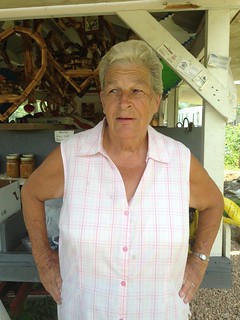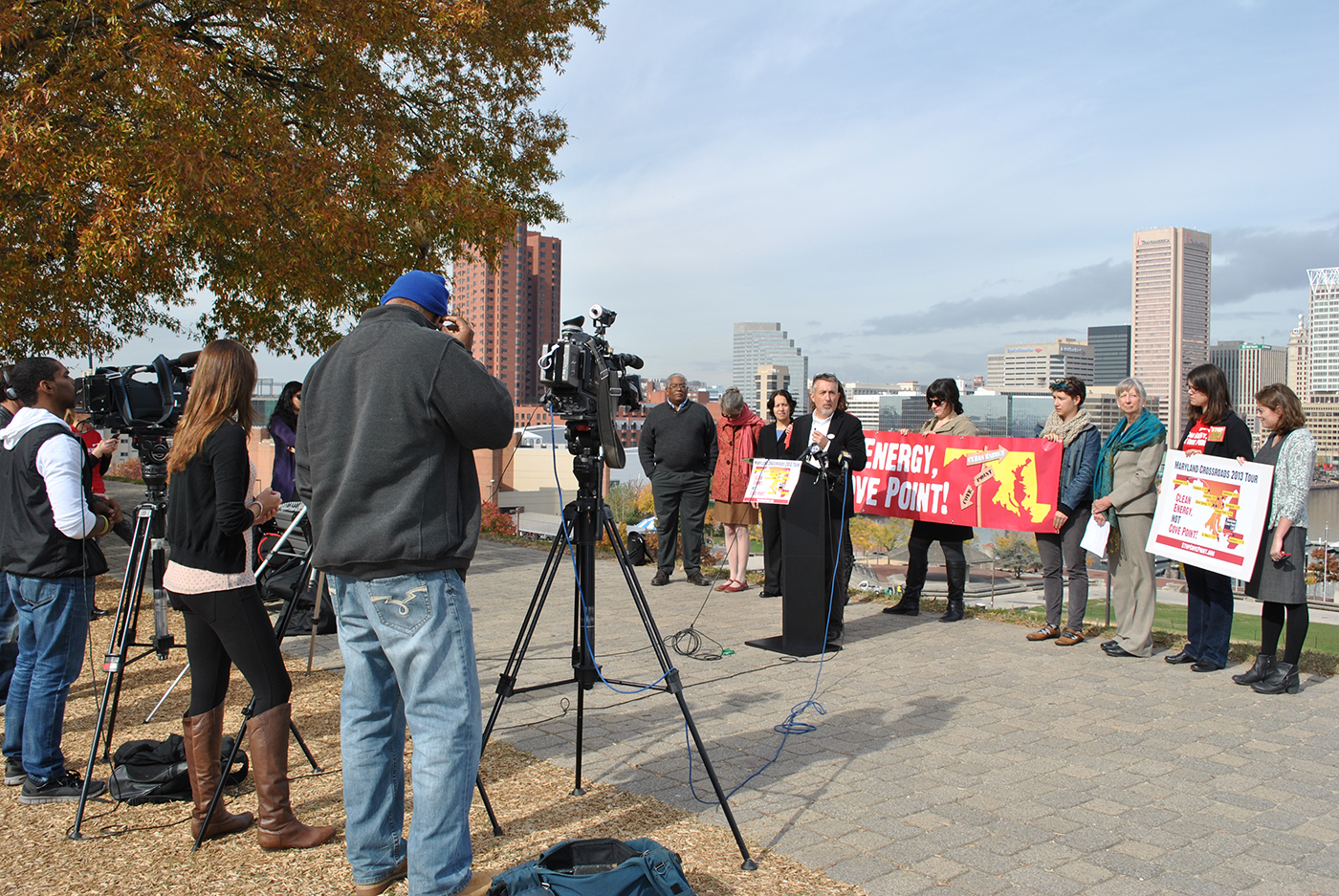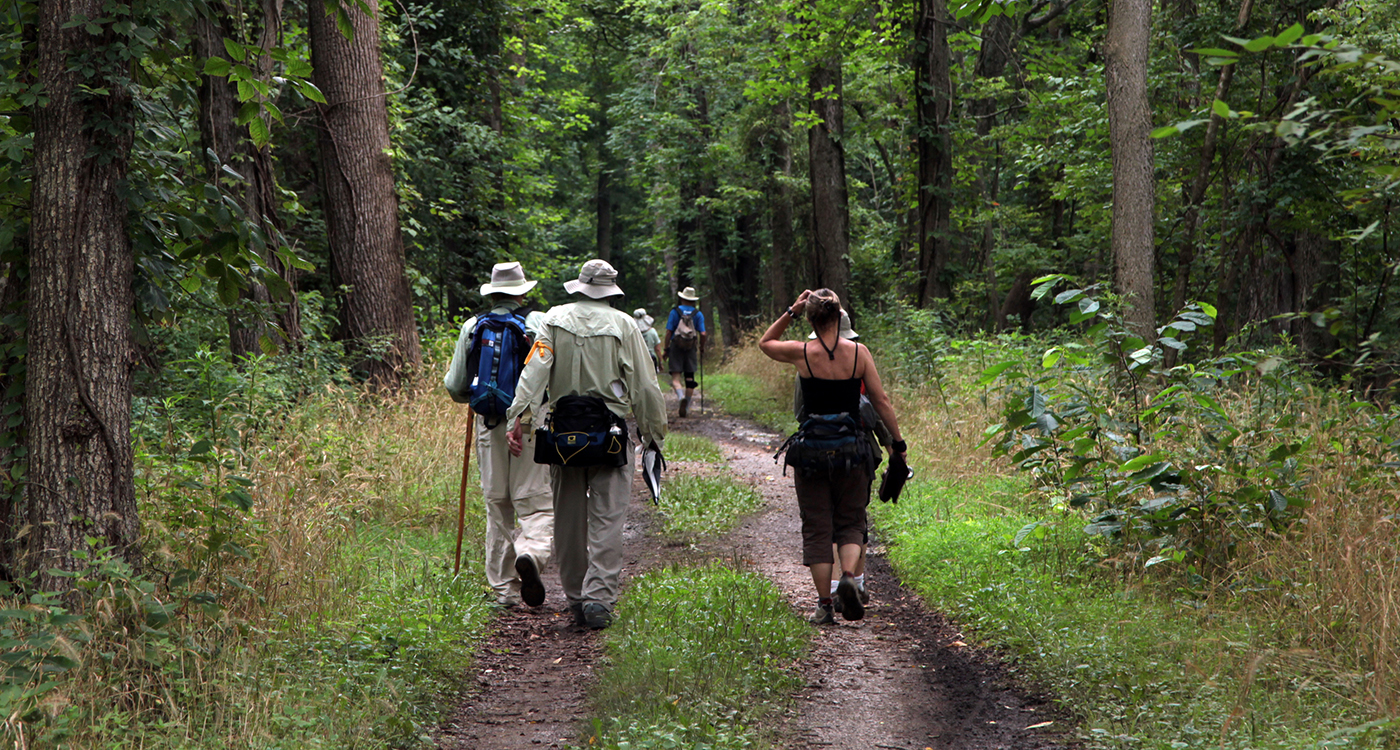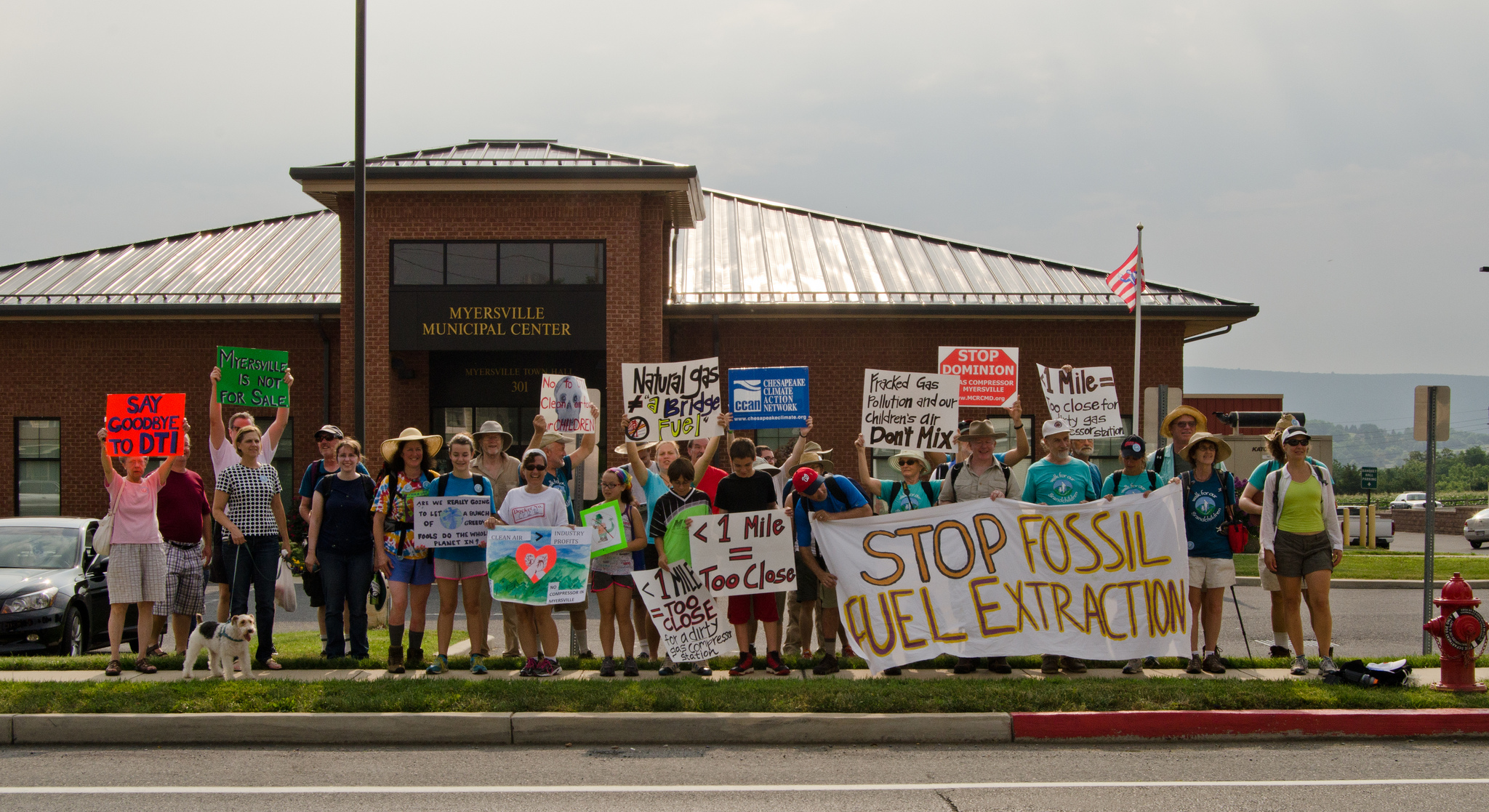At one time, few people came to Dominion’s public meetings because they were “so boring,” an almost wistful Dominion spokesman, Don Donovan, told WAMU-FM in recent a news report.
Well, they’re attending now. Calvert County residents are taking note and finding nothing boring about Dominion’s plan for a $3.8 billion facility at Cove Point to export fracked natural gas to India and Japan.
People don’t come “unless somebody scares them to come,” Donovan said.
 Or maybe they find out the stark truths hidden behind the fancy news releases about jobs (not so many permanent ones) and tax revenue (minus some hefty tax giveaways). After a news conference called by a Chesapeake Climate Action Network (CCAN)-led coalition in September, regional media have been waking up to Calvert County as ground zero in this scheme. And residents of Lusby, who live closest to the planned facility, are making their voices heard. So far, coverage of the “Clean Energy, Not Cove Point” campaign has appeared in Southern Maryland Newspapers Online (SoMdNews), Bay Net, the Bay Journal, WAMU-FM, the Washington Post, Baltimore Sun, the Daily Record (subscription req’d), the Frederick News-Post, and WJZ-TV.
Or maybe they find out the stark truths hidden behind the fancy news releases about jobs (not so many permanent ones) and tax revenue (minus some hefty tax giveaways). After a news conference called by a Chesapeake Climate Action Network (CCAN)-led coalition in September, regional media have been waking up to Calvert County as ground zero in this scheme. And residents of Lusby, who live closest to the planned facility, are making their voices heard. So far, coverage of the “Clean Energy, Not Cove Point” campaign has appeared in Southern Maryland Newspapers Online (SoMdNews), Bay Net, the Bay Journal, WAMU-FM, the Washington Post, Baltimore Sun, the Daily Record (subscription req’d), the Frederick News-Post, and WJZ-TV.
Continue reading
Weekly Climate Insider: Chinese Smog, Powershift, and Fracking in Virginia
Bad news from Huffington Post: The Canadian Arctic has reached the highest temperatures in at least 44,000 years. Gifford Miller, a researcher at the University of Colorado, Boulder, says, “This study really says the warming we are seeing is outside any kind of known natural variability, and it has to be due to increased greenhouse gases in the atmosphere.” This study reaffirms that global temperatures are rising at an unprecedented rate: we’ve seen a warming trend for the past century, but the process has been accelerating significantly since the 1970s and has skyrocketed in the last twenty years. Miller didn’t end on a happy note. “We expect all of the ice caps to eventually disappear, even if there is no additional warming.
Continue reading
More than 300 people attend Calvert County town hall meeting concerning controversial proposal to export fracked gas from Maryland to Asia
The first town hall meeting concerning the risks of the proposed Cove Point LNG export terminal in Maryland was held Tuesday night, October 23. It was a big and rousing success. At least 300 people attended, most of them local residents. It was held at the Southern Community Center in Lusby, Md. in Calvert County, just a few miles from where Dominion Resources wants to build an industrial terminal to export fracked natural gas — piped in from Appalachia — and ship it to India and Japan. The $3.8 billion facility would chill the gas to 270 degrees below zero, turning it into liquid for 1000-foot-long shipping tankers coming into the Bay. It would generate 3.3 million tons of CO2 pollution per year. (You can learn more about the health and environmental risks of exporting fracked gas from Maryland by clicking here.)
Camp David to the White House: The first three days of extreme heat and high spirits
I’ve walked thirty miles across Maryland the past three days in the middle of the worst heat wave of the year. The heat index has soared well above 100 each day, causing the corn fields and forests to shimmer in the distance. My feet, meanwhile, are so tender I’ve literally begun applying duct tape to the balls of my feet to ward off blisters.
And I couldn’t be in higher spirits. Why? Because today I get to do it all over again with 60-70 inspiring climate activists from across the country as part of the “2013 Walk for Our Grandchildren.” For eight days, from July 19-27th, we are walking 100 miles from the gates of Camp David — the presidential retreat in western Maryland — all the way to the White House. Our goal: Tell President Obama to stop the Keystone XL tar sands pipeline and accelerate solutions to global warming.
 Already, we’ve walked through the “green tunnels” of the Catoctin Mountains. We’ve marched across soybean farms and into towns with one stoplight. We camped one night on a Civil War battlefield. What keeps us going with bandaged feet and evaporating pounds are the stories we hear along the way. We met farmer Shelly Wolf who says the weather in rural Frederick County Maryland is unrecognizable compared to when she and her husband bought their farm 58 years ago. The snow back then would shut down their country road for a week at a time. Now it barely snows. And today it’s not just the heat waves but the summer humidity! Insufferable, she says. There was nothing like it during her childhood.
Already, we’ve walked through the “green tunnels” of the Catoctin Mountains. We’ve marched across soybean farms and into towns with one stoplight. We camped one night on a Civil War battlefield. What keeps us going with bandaged feet and evaporating pounds are the stories we hear along the way. We met farmer Shelly Wolf who says the weather in rural Frederick County Maryland is unrecognizable compared to when she and her husband bought their farm 58 years ago. The snow back then would shut down their country road for a week at a time. Now it barely snows. And today it’s not just the heat waves but the summer humidity! Insufferable, she says. There was nothing like it during her childhood.
Continue reading
#Walk4Grandkids Day 2: Standing with Myersville
The following is a Day 2 update by Greg Yost, who’s on the trail of the Walk for Our Grandchildren, July 19th-July 27th.
“I say, ‘Shut up, legs!'”—German cycling hard man Jens Voigt on his secret to his success.
Toes, feet, calves, knees. We received quite an education today in the lower anatomy and its surprising potential for creating human misery. But the 2013 Walk For Our Grandchildren is never intimidated. We say, “Shut up, legs!” and on we go!
Our first stop today was Myersville, MD, the site of a proposed gas compressor station on the edge of town.
This is an interesting story. What happens when a corporation runs headlong into a town with an activated citizenry that just doesn’t roll over for them? Dominion Transmission, Inc.(DTI), a subsidiary of Dominion Resources, wants to site a key piece of fracking infrastructure in Myersville as one link in a chain allowing them to move fracked gas from the Marcellus Shale to an eventual export terminal at Cove Point, MD. And this is a pretty good idea, too. Or at least it is if you’re DTI.
Continue reading
Toward Our Own Tipping Point: Why I'm Walking for Our Grandchildren
This is one in a series of posts sharing the stories of grandparents, parents and young people who are joining the Walk for Our Grandchildren, July 19th-27th.

This week-long, 100-mile walk will bring an intergenerational message of hope from Camp David to the White House to demand that President Obama reject the Keystone XL tar sands oil pipeline and confront the growing crisis of climate change. You can join us for a day on the trail, or join walkers and thousands of others for a culminating rally at the White House on July 27th. Click here to learn more and sign up.
By Elisabeth Hoffman, Clarksville, Maryland
 My parents married in November 1945, just months after the end of World War II. My father had worked in the Navy developing radar; my mother used coupons to buy rationed food and fabric, gasoline and tires. At the war’s end, after their work and sacrifice, they decided it was safe to get married. As much as was possible, they could count on a future for themselves and their children.
My parents married in November 1945, just months after the end of World War II. My father had worked in the Navy developing radar; my mother used coupons to buy rationed food and fabric, gasoline and tires. At the war’s end, after their work and sacrifice, they decided it was safe to get married. As much as was possible, they could count on a future for themselves and their children.
My children were born in 1984 and 1994. I can’t know what their future holds, but my actions now — while we still have time to avert the worst climate changes — will shape their world.
This is our time to do whatever we can to ensure a future for our children, our grandchildren and generations to come. Even if that requires a WWII-like effort.
Continue reading
Md. State Agency Puts 'Cart Before Horse' on Fracking
Without first measuring risks to people and land, state proposes inadequate ‘best practices’ guidelines for drilling
BALTIMORE—Despite explicit concerns from landowners and environmentalists, the Maryland Department of the Environment (MDE) yesterday issued a “best practices” draft report for companies that want to drill for fracked natural gas in Maryland. The agency released the report before formally assessing and inventorying the actual risks of the controversial drilling method itself. The failure to assess the likely impacts of fracking on human and natural communities—as a first step—renders the “best practices” report premature and deeply problematic, according to Maryland civic and environmental leaders.
“The cart has been put before the horse on fracking in Maryland,” said Mike Tidwell, director of the Chesapeake Climate Action Network. “What sense does it make to lay out guidelines for the ‘best way’ to frack for natural gas when the state hasn’t formally inventoried the risks and harm that could come the moment drill bits enter our soil?”
Ernest Moniz and the Growing No-Fracking Movement
It is very unfortunate that Ernest Moniz, the new Energy Secretary, is, like Barack Obama, an “all of the above” energy guy.
In his first week in office last week, he said some good things publicly about energy efficiency and solar, wind and geothermal energy.
The problem, however, is that Moniz is a big supporter of fracking. In the same interview linked above, he describes shale gas as a “bridge fuel,” giving us time, he says, to “develop the technology and lower the costs” of clean, renewable energy.
Marylanders tell General Assembly to “Get to Work” on fracking protections
The following blog post was originally posted under the title, “dear legislators…” on the ClimateHoward Blog: http://climatehoward.wordpress.com/. It was written by Elisabeth Hoffman.
So, we are taking stock. On the downside: The fracking moratorium legislation for Maryland fell one vote short of getting out of its Senate committee during this General Assembly session.
On the plus side: The Senate committee at least voted. And the vote was sooo close.
And, we are not going away. Or giving up.
That was the message from more than 150 concerned Marylanders at yesterday’s rally in front of the State House in Annapolis. In the pointed words of Mike Tidwell, Chesapeake Climate Action Network’s director, we told legislators: You had better “get to work” to protect communities, the environment and the climate from fracking.
The rally, organized by CCAN, included parents and grandparents, college and high school students and teachers (including a group from Glenelg Country School in Howard County), a couple of babies in backpacks and strollers, nurses and other activists, and Western Maryland residents who live in areas that would be drilled or where natural gas compressor stations are planned.
One of the biggest lessons of the day, though, came from Lois Gibbs, who organized her Love Canal neighbors in the late 1970s when toxic waste buried under their homes and schools started making people sick.
Bill Introduced To Put A Moratorium On Fracking
Reporting Alex DeMetrick
ANNAPOLIS, Md. (WJZ)—Even though it promises money and jobs, efforts are underway to keep fracking from Maryland. At least until the risks are evaluated.
Alex DeMetrick reports the controversial drilling technique has freed up huge reserves of natural gas as well as worry.
The wells travel the spine of a vast deposit of shale rich in natural gas. High pressure streams of water and chemicals fractures the shale and releases the gas.
It’s called fracking, and now legislation has been introduced that would put a moratorium on fracking in Maryland.




